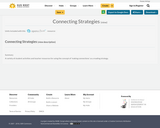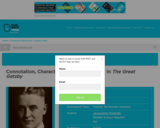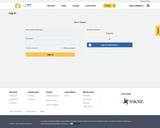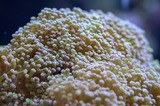
A variety of student activities and teacher resources for using the concept of 'making connections' as a reading strategy.
- Subject:
- English Language Arts
- Material Type:
- Activity/Lab
- Teaching/Learning Strategy
- Date Added:
- 10/01/2018

A variety of student activities and teacher resources for using the concept of 'making connections' as a reading strategy.

Students in grades 4-6 engage in a series of activities (both inside and outside the classroom) designed to inspire a sense of environmental stewardship. Each of the activities is intended to have children explore their profound connection to nature and experience the power of individual and collective action.
Students explore the daily choices, they, their families, their school and their communities make; the impact of those choices on nature; and the role they and others may take in protecting nature.
The activities are fun, hands-on, and thought provoking. Students have opportunities to share what they are learning with their fellow students, family, and community and to create their own “class foundation” to collectively act on their concerns and passions.
The resource consists of 16 cross-curricular lessons on a range of issues from which teachers may select according to the dictates of their time and curriculum.

Students explore the connotations of the colors associated with the characters in F. Scott Fitzgerald's "The Great Gatsby."

Using Construct-a-Word, students learn letter-sound correspondence by combining a beginning letter or blend to a word ending to create words.

After reading "The Tempest" or any other play by William Shakespeare, students work in small groups to plan, compose, and perform a choral reading based on a character or theme.

Students examine consumer choices and fair trade in this excellent grade 7/8 project. Choices are available for I DO, WE DO and YOU DO.

- Student Presentations
- Conversation Practice
- Professional Development
- Rich Assessment
- Safe and Accountable

Use the "Slinky Test" to get students to start thinking about sentence length and variety.
This resource provides a video to explain the strategy and a number of supports to help you teach students when to use sentences of varied length to improve their writing.

In this work of fiction, Rooster and his eager friends set out to make strawberry shortcake, a recipe from Little Red Hen's cookbook. Rooster is glad to have help, but none of his friends know how to cook, so Rooster forges ahead to teach the helpers the basics of cooking and baking, with very funny results

Students explore the menu genre by analyzing existing menus from local restaurants. They review adjectives and descriptive writing and then work in groups to create their own custom menus.

Cool Kid Facts gives your child access to educational videos, pictures, quizzes, downloadable worksheets, and infographics. They can use these to learn about geography, history, science, animals, and even the human body.
***Select the subject you'd like to explore from the menu along the top to get started.

Check out the "cool" educational YouTube videos from Cool School!

Free Online Math Games, Cool Puzzles, and More. Also check out out language, memory, jigsaw, geography and science games on the site.

This week, Stan Muller teaches you the basics of copyright in the United States. Copyright law is territorial, so we're going to cover the system we know the most about, and that's the US. Stan will talk about what kind of ideas can be copyrighted, who can get a copyright, and what protections the copyright grants. We'll also talk about the always contentious and seemingly ever-growing term of copyright. Stan will also teach you about the low bar for creativity, which means that original work doesn't have to be all that original, and he'll also touch on the problems with copyright in the modern world.

Stan Muller teaches you a few things about copyright enforcement, and talks about the exceptions to copyright enforcement. While there are several, the one you've probably heard of is Fair Use, and it's a pretty tricky one. We'll try to explain it, and teach you just why fair use is so loosey goosey.

This lesson takes advantage of students' interest in music and audio sharing. Students investigate multiple perspectives in the music downloading debate and develop a persuasive argument for a classroom debate.

Students investigate how and why copyright law has changed over time, and apply this information to recent copyright issues, creating persuasive arguments based on the perspective of a particular group.

Corals are beautiful, diverse and complex structures. Nearly everyone knows about Coral Reefs, but do you know what they actually are...? Coral Reefs are vital animals that provide the foundation for the richest diversity in the ocean. Explore the important role that corals have for the oceans worldwide, and understand how our small choices can have a powerful impact on life in the ocean.

The Folger Shakespeare Library provides the full searchable text of "Coriolanus" to read online or download as a PDF. All of the lines are numbered sequentially to make it easier and more convenient to find any line.

Students will eat up this lesson about oranges as they practice the skills that help them investigate and make detailed observations for descriptive purposes.